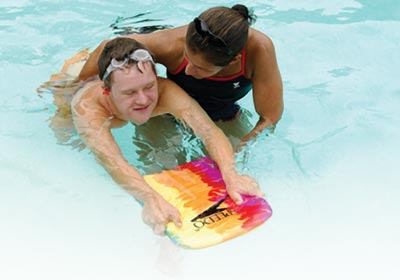Why should aquatics professionals earn their credential in adapted aquatics? Why not? If you’re like me, you probably devour all kinds of training programs, from pool operator certification to water safety instructor to lifeguard training. Why do we get trained in these other areas, yet so many of us don’t consider becoming adapted aquatics instructors (AAIs)?
Yes, certain certifications are required for our jobs, while training in other areas are simply valuable assets to being a highly skilled aquatics professional. I teach swim lessons and instruct others on how to help children be safe in the water. I do not lifeguard, yet I believe it’s important to keep my Lifeguard Training Certification current, and to practice those skills.
Some people might feel more comfortable learning these concrete topics as opposed to the seemingly more complex subject of adapted aquatics. After all, there are many different types of disabilities and many constellations of those disabilities within their own disability classes. For example, teaching children with autism to swim can be vastly different than teaching an adult with Down syndrome to swim. There are also many similarities, and learning how to teach both these populations isn’t that difficult once you have some basic tools.
My own lifeguard certification is an important part of being a comprehensive swim instructor. I need to know as much as I can about the aquatic environment. Likewise, isn’t it equally important to know about teaching swimming and aquatic skills to children and adults with disabilities, even if you might not spend a lot of time doing so?
If you’re not convinced yet, here are seven more reasons why it’s important to become a certified adapted aquatics instructor.
1. Getting certified is part of being a well-rounded professional. Aquatics professionals and swim participants both benefit when professionals know as much as they can about the people they serve, as well as their needs and any issues that might arise from differences in abilities.
2. It increases your skill set. Becoming an AAI provides you with the skills, knowledge and appropriate attitude to be a more inclusive and effective instructor to all students in your programs. AAIs have a breadth of knowledge that other aquatics professionals don’t, which makes them more marketable.
3. It improves your risk management profile. AAIs have knowledge and skills that help them foresee disability-related issues in a clear, nonbiased light, allowing them to be more comfortable in their service provision overall. Increased knowledge also can lead to better planning for safety and make your pool a safer place.
4. It is good for business. Having AAIs on staff draws people to your facility to participate in adapted aquatics programs along with their families and friends. No longer are those with disabilities excluded from using your facility simply because you lack instructors to assist them. Why not serve all members of your community?
5. AAIs can help improve America’s fitness bottom line, not to mention boost its emotional health. People with disabilities suffer high rates of obesity than people without disabilities. There are various contributing factors, one of which is that disabilities often prevent or discourage people from getting physical exercise, according to reports in the journal ScienceDaily and JAMA. Numerous studies over the years have demonstrated the emotional benefits of physical activity as well. Swimming is exceptionally good because the water provides a near-weightless environment for those with mobility limitations.
6. Most important, AAIs “see” with new eyes. No matter what the sport, serving people with disabilities can open up a whole new world for us as professionals. We learn that there are more ways to get from one end of the pool to the other than we thought, literally and figuratively. Not only do we expand the horizons of people who tend to be marginalized — or worse, forgotten or ignored — we reach horizons previously unknown to ourselves. Anyone who has ever taught a new skill to a disabled child or adult knows the significance of inclusion for the giver and the receiver. We also learn new things about our own challenges and better appreciate our abilities.
7. It’s the law — at least in Florida. That’s right, per state law, Florida swim instructors are required to have training in adapted aquatics. It makes sense, and I hope other states adopt similar requirements.



